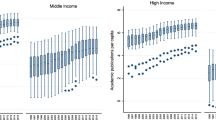Abstract
Traditional input indicators of research performance, such as research funding, number of active scientists, and international collaborations, have been widely used to assess countries’ publication output. However, while publication in today’s English-only research world requires sound research in readable English, English proficiency may be a problem for the productivity of non-native English-speaking (NNES) countries. Data provided by the Brazilian National Research Council (CNPq) containing the academic profile of 51,223 Brazilian researchers show a correlation between English proficiency and publication output. According to our results, traditional input indicators may fall short of providing an accurate representation of the research performance of NNES developing countries.
Similar content being viewed by others
References
Barré, R. (2001), Sense and Nonsense of S & T Productivity Indicators. The Contribution of European Socio-Economic Research to the Benchmarking of RTD Policies in Europe. Available at http://ftp.cordis.europa.eu/pub/improving/docs/ser_conf_bench_barre.pdf
Bauwens, L., Mion, G., Thisse, J. F. (2007), The Resistible Decline of European Science. CORE Discussion Paper from the Belgian Program on Interuniversity Poles of Attraction, Dec 2007. Available at http://www.core.ucl.ac.be/econometrics/Bauwens/papers/CORE-DP2007-92.pdf
Bazerman, C., Paradis, J. (Eds) (1991), Textual Dynamics of the Professions, Madison, Wisconsin, The University of Wisconsin Press.
Belcher, D. D. (2006), Seeking Acceptance in an English-only Research World. Journal of Second Language Writing, 16(1): 1–22.
Benfield, J. R., Howard K. M. (2000), The language of science. European Journal of Cardiothoracic Surgery, 18(6): 642–648.
Brazilian National Research Council (CNPQ), Diretório de Grupos de Pesquisa. Available at http://dgp.cnpq.br
Canagarajah, A. S. (2005), The language issue in Brazil: When local knowledge clashes with expert knowledge. In: Canagarajah, A. S. (Ed.), Reclaiming the Local in Language Policy and Practice. Lawrence Erlbaum Publishers, USA.
Celani, M. A. A. (1998), A retrospective view of an ESP teacher education programme. The ESPecialist, 19: 233–244.
Coates, R., Sturgeon, B., Bohannan, J., Pasini, E. (2002), Language and publication in “Cardiovascular Research” articles. Cardiovascular Research, 53(2): 279–85.
Fahnestock, J., Secor, M. (1991), The rhetoric of literary criticsim. In: Bazerman, C., Paradis, J. (Eds) (1991), Textual Dynamics of the Professions, Madison, Wisconsin, The University of Wisconsin Press, pp. 76–95.
Freeman, P., Robbins, A. (2006), The publishing gap between rich and poor: The focus of AuthorAID. Journal of Public Health Policy, 27: 196–203.
Gauffriau, M., Larsen, P. O. (2005). Counting methods are decisive for rankings based on publication and citation studies. Scientometrics, 64(1): 85–93.
Glänzel, W., Leta, J., Thijs, B. (2006), Science in Brazil. Part 1: A macro-level comparative study. Scientometrics, 67(1): 67–86.
Godin, B. (2003), The emergence of science indicators: Why did governments supplement statistics with indicators? Research Policy, 32(4): 679–691.
Gomes De Matos, F. G., Pinto, A. P. (2000), English language education in Brazil: Progress and partnerships. ESL Magazine, 3(6): 26–28.
InfoCAPES (2000), Boletim Informativo (CAPES’ Informative Bulletin), 8(1), The Brazilian Ministry of Education (MEC), Brasília. Available at http://www.capes.gov.br/export/sites/capes/download/bolsas/InfoCapes8_1_00.pdf
InfoCAPES (2001), Boletim Informativo (CAPES’ Informative Bulletin), 9 (1), The Brazilian Ministry of Education (MEC), Brasília. Available at http://www.capes.gov.br/export/sites/capes/download/bolsas/InfoCapes9_1_01.pdf
Kondo, E. K. (1998), Desenvolvendo indicadores estratégicos em ciência e tecnologia: As principais questões (“Developing strategic science and technology indicators: Major issues”). Ciência da Informação, 27(2): 128–133.
La Madeleine, B. L. (2007), Lost in translation. Nature, 445(25): 454–455.
Man, J. P., Weinkauf, J. G., Tsang, M., Sin, D. D. (2004), Why do some countries publish more than others? An international comparison of research funding, English proficiency and publication output in highly ranked general medical journals. European Journal of Epidemiology, 19: 811–817.
Meneghini, R, Packer, A. L. (2007), Is there science beyond English? Initiatives to increase the quality and visibility of non-English publications might help to break down language barriers in scientific communication. EMBO Reports, 8(2): 112–116.
National Science Indicators (2007), Science in Brazil, 2001–2006. Available at http://www.in-cites.com/research/2007/december_24_2007-2.html and http://www.in-cites.com/research/2007/december-24_2007-4.html.
OECD (1976), Science and technology indicators. DSTI/SPR/76, 43. In: Godin, B. (2003), The emergence of science indicators: Why did governments supplement statistics with indicators? Research Policy, 32(4): 679–691.
Ortiz, R. (2004), English and the social sciences. Revista Brasileira de Ciências Sociais, 19(54): 5–22.
Rajagopalan, K. (2005), The language issue in Brazil: When local knowledge clashes with expert knowledge. In: Canagarajah, A. S. (Ed.), Reclaiming the Local in Language Policy and Practice. Lawrence Erlbaum Publishers, EU, pp. 99–122.
The British Council (2005), The Landmark Review of English Language Teaching in Brazil. Report. The British Council, pp. 1–72.
UNESCO Institute for Statistics (UIS) (2002), Science and Technology Statistics and Indicators in Developing Countries: Perspectives and Challenges. UNESCO Institute for Statistics (UIS). Available at http://www.uis.unesco.org/template/pdf/sc/st_background.pdf
Vasconcelos, S. M. R., Leta, J., Sorenson, M. M. (2007a), English Proficiency: A Potential Science Indicator? 11th International Conference of the International Society for Scientometrics and Informetrics, 2007, Madrid, Spain. Proceedings of ISSI 2007. CINDOC, CSIC, Madrid, Spain, Vol II, pp. 948–949.
Vasconcelos, S. M. R., Leta, J., Sorenson, M. (2007b), Scientist-friendly policies for non-native english-speaking authors: Timely and welcome. Concepts and comments. Brazilian Journal of Medical and Biological Research, 40: 743–747.
Vasconcelos, S. M. R., Sorenson, M. M., Leta, J., Batista, P. D., Sant’ana, M. (2008), Researchers’ writing competence: A bottleneck in the publication of Latin-American science? EMBO Reports, 9: 700–702.
Victora, C. G., Moreira, C. B. (2006), North-South relations in scientific publications: Editorial racism? Revista de Saúde Pública, 40: 36–42.
Author information
Authors and Affiliations
Corresponding author
Rights and permissions
About this article
Cite this article
Vasconcelos, S.M.R., Sorenson, M.M. & Leta, J. A new input indicator for the assessment of science & technology research?. Scientometrics 80, 217–230 (2009). https://doi.org/10.1007/s11192-008-2082-z
Received:
Published:
Issue Date:
DOI: https://doi.org/10.1007/s11192-008-2082-z




